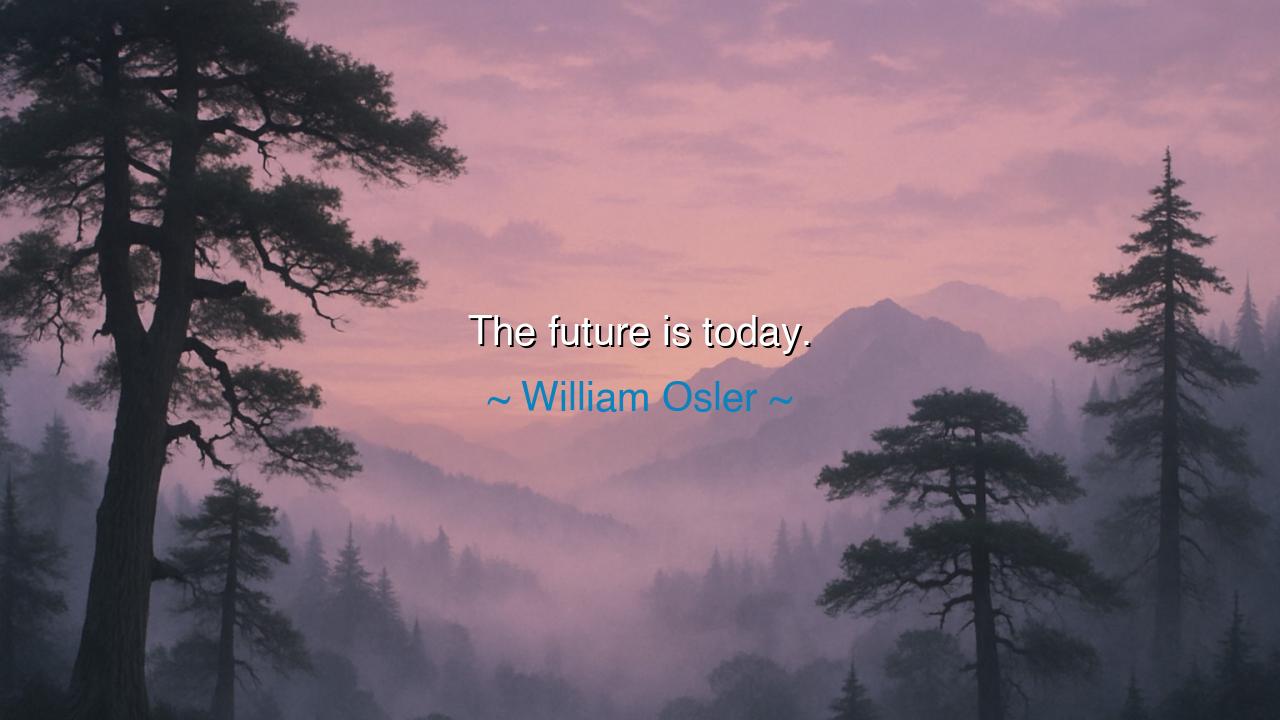
The future is today.






"The future is today." – William Osler.
In these few, powerful words, William Osler imparts a timeless truth: the future is not a distant concept waiting to be realized, but an extension of the actions we take today. His words remind us that time is a constant flow, and the future is shaped not by abstract thoughts or distant dreams but by the choices, decisions, and actions we make in the present moment. To live with a sense of urgency, to understand that the future is not something far off but something that begins in this very moment, is to embrace the profound responsibility we have to create the future we desire. Osler calls us to recognize that the power of the future lies in our hands now, urging us to take action rather than delay.
The ancient Greeks understood the vital importance of living in the present and embracing the now as the doorway to the future. The philosopher Heraclitus famously declared that “everything flows”—that time is an ever-changing river, and we cannot step into the same river twice. In this understanding, the present is a constant transition to the future, and we must embrace it fully to shape the world around us. Aristotle echoed this sentiment in his discussions on virtue and action, teaching that the character of an individual is defined by their choices made in the present, which shape their future and the future of their society. Osler’s quote reflects this ancient wisdom, urging us to recognize that the future is not something to passively wait for, but something we actively shape in the here and now.
Consider the life of Alexander the Great, whose ambition and vision were not confined to a distant future. His life was a relentless series of decisions and actions, each taken with the understanding that his future kingdom would be built not by waiting for tomorrow, but by seizing the opportunities of today. Alexander’s military campaigns, his forging of alliances, and his boldness in action were all grounded in the belief that the future could be shaped through the choices he made in the present. His extraordinary accomplishments remind us that the future is built by the present, and that waiting or hesitating often leads to missed opportunities.
In more modern history, the great scientist and inventor, Thomas Edison, embodies the spirit of Osler’s words. Edison, whose many inventions transformed the world, was known for his unrelenting drive to take action. He didn’t wait for the future to unfold; he shaped it through his experiments, his failures, and his relentless pursuit of new ideas. His invention of the lightbulb was not the result of idle dreams, but of intense daily work, commitment, and the belief that today’s efforts would create the breakthroughs of tomorrow. Edison’s life reminds us that progress does not come from waiting for the right moment, but from seizing the moment at hand and putting in the work to make the future a reality.
The Renaissance period is another example of the concept that the future begins today. Leonardo da Vinci, whose genius spanned art, science, and invention, didn’t wait for the future to inspire him. Instead, he actively engaged with the world of his time, drawing inspiration from the present and creating works that would influence generations to come. His notebooks, filled with ideas for inventions, sketches, and scientific observations, show a mind that understood that the future of knowledge and creativity was not something to be hoped for—it was something to be acted upon in the present. Da Vinci’s works, like Osler’s quote, show that the future is shaped by the actions we take today, and that vision is nothing without execution in the moment.
The lesson in Osler’s words is clear: the future is not something that exists in the distant horizon, waiting for us to arrive at it; rather, it is a creation of the choices we make and the actions we take right now. If we want to change the course of our lives, if we wish to create a world that reflects our dreams, we must begin today. Procrastination is the enemy of progress, and delay often leads to missed opportunities. Like the ancients who recognized that action in the present was the key to building a better future, we too must take responsibility for the future we want to see and act accordingly.
In our own lives, we must take Osler’s insight to heart and ask ourselves: what can we do today to shape the future we desire? Whether it’s in our personal development, our careers, or our contributions to society, the future begins now. Each decision, each action, no matter how small, is a step toward the world we will inhabit tomorrow. Let us not wait for some distant moment to change, but embrace the present moment as the seed of our future. As the ancients and modern innovators have shown us, action is the key to unlocking the potential of tomorrow. The future is today, and by acting now, we can create a world worthy of the possibilities we envision.






AAdministratorAdministrator
Welcome, honored guests. Please leave a comment, we will respond soon